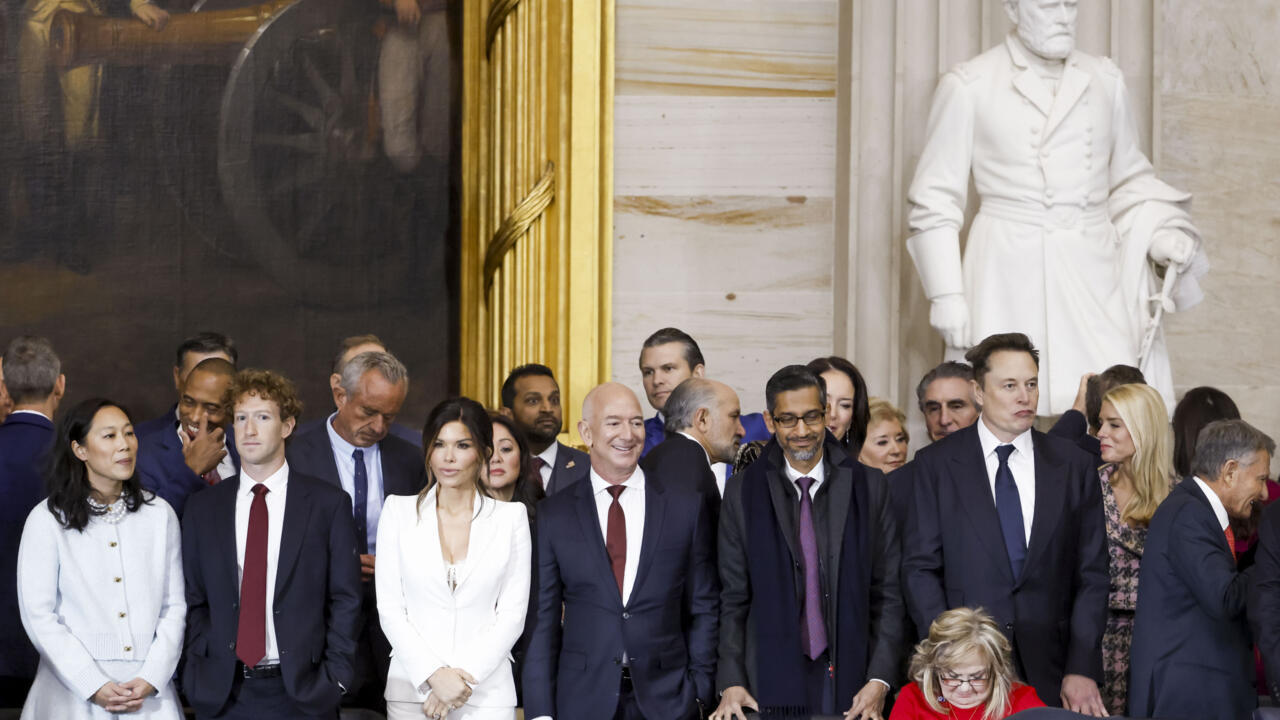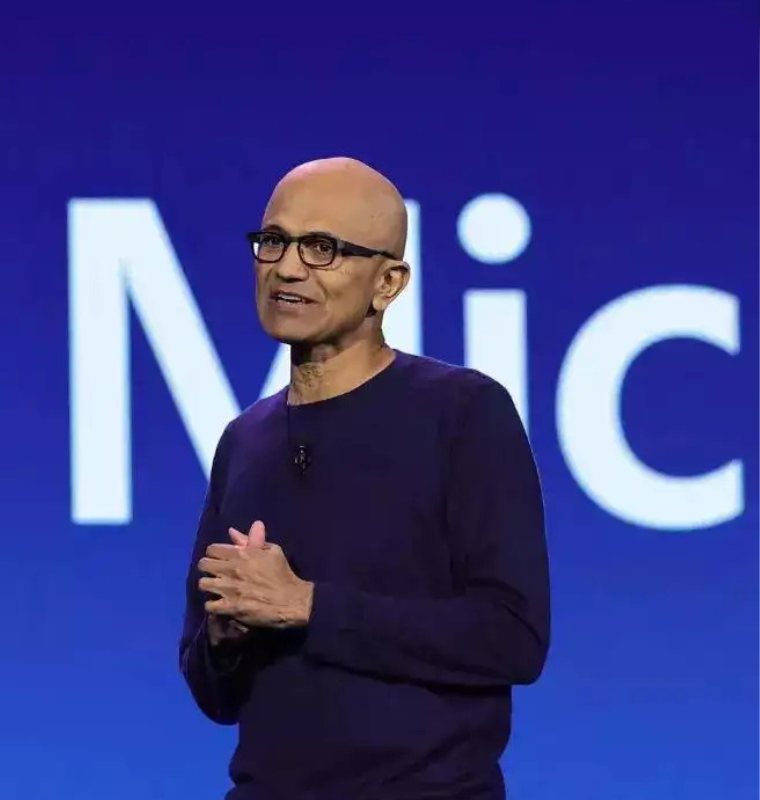Billionaire Bloodbath: Musk, Bezos & Zuckerberg Suffer Over $23 Billion Each in Wealth Wipeout Amid Trump’s Tariff Storm
Billionaire Bloodbath: Musk, Bezos & Zuckerberg Suffer Over $23 Billion Each in Wealth Wipeout Amid Trump’s Tariff Storm
By
Junia Wells
Last updated:
April 5, 2025
First Published:
April 6, 2025

Priscilla Chan, Meta CEO Mark Zuckerberg, Lauren Sanchez, Jeff Bezos, Alphabet CEO Sundar Pichai, and businessman Elon Musk attend the inauguration ceremony of US President-elect Donald Trump in the US Capitol Rotunda on January 20, 2025 © Shawn THEW / POOL/AFP
The Billionaire Blowback
Wall Street just witnessed one of its most brutal two-day meltdowns in recent history — and some of the wealthiest individuals on Earth are paying the price. Mark Zuckerberg, Elon Musk, and Jeff Bezos each saw their fortunes shrink by over $23 billion, after President Donald Trump's aggressive tariff policy announcement triggered a chain reaction of fear, sell-offs, and market chaos.
The financial carnage comes as Trump’s new tariff regime, dubbed a “reciprocal trade correction,” shocked global investors and hit tech-heavy portfolios hardest. The move marks one of the most consequential trade decisions in recent U.S. history, with sweeping implications across industries, countries, and markets.
Trump’s Tariff Gambit: What Happened?
On Wednesday, President Trump revealed a new two-tier tariff policy aimed at narrowing the U.S. trade deficit and retaliating against what he called "decades of unfair trade practices." His plan includes:
- A 10% universal tariff on all imported goods, starting April 5.
- Additional “individualized” tariffs targeting specific countries, ranging between 25% and 54%.
The heaviest levies hit countries critical to U.S. tech and manufacturing supply chains:
- China: Import tariffs raised to a whopping 54%
- Taiwan: Now facing 32% tariffs
- India: Imports slapped with a 26% duty
These countries are among the largest suppliers of computer chips, IT services, and electronic components — essential to companies like Tesla, Amazon, and Meta.
Market Collapse: A 2-Day Tech-Driven Sell-Off
Following Trump’s announcement, major stock indices plummeted:
- Dow Jones Industrial Average: -5.1%
- S&P 500: -5.3%
- Nasdaq Composite: -5.8%
The tech sector bore the brunt of the crash. Semiconductor stocks, consumer tech giants, and logistics firms all plunged as fears of disrupted supply chains and declining consumer spending took hold.
The Billionaire Fallout: Massive Losses Across the Board
According to the Bloomberg Billionaires Index, the market nosedive inflicted historic losses on the world’s richest:
- Elon Musk: Lost $30.9 billion in just two days
- Mark Zuckerberg: Down $27.34 billion
- Jeff Bezos: Wealth fell by $23.49 billion
These three, who hold vast stakes in Tesla, Meta, and Amazon respectively, now top the list of biggest losers in what Bloomberg called the largest two-day net worth drop in the index’s history.
Year-to-date, Elon Musk has now lost a staggering $130 billion, although he remains the world’s wealthiest person with a net worth of $302 billion — well ahead of Bezos at $193 billion and Zuckerberg at $179 billion.
Company Woes: Tech Titans Stumble
The tariff announcement coincided with poor quarterly performance reports from some of these tech behemoths. Tesla reported:
- Q1 sales of 336,681 units — a 13% decline year-over-year
- Worst-performing quarter since Q1 2022
Amazon and Meta, meanwhile, face increasing pressure from rising production costs, slowing ad revenue, and lower consumer sentiment. Meta’s international ad growth has also shown signs of softening as emerging markets brace for inflation and higher import prices due to tariffs.
A Ripple Effect: Other Billionaires and the Silver Lining
While many ultra-rich saw red, a few managed to swim against the tide:
- Dan Gilbert, co-founder of Rocket Mortgage and owner of the Cleveland Cavaliers, added $1.91 billion to his wealth on Friday — now sitting at $32.4 billion
- Carlos Slim, the 85-year-old Mexican magnate, gained $2.9 billion on Thursday, only to lose $5.48 billion the next day
- His net worth stands at $80 billion, driven by holdings in Grupo Carso and América Móvil
Slim, a seasoned investor who led Forbes’ richest list from 2010 to 2013, believes Trump’s tariffs are likely short-term bargaining chips. “The U.S. doesn’t have any other alternative rather than changing how it does things,” he told Bloomberg, predicting that these protectionist moves may eventually give way to renegotiated trade terms.
Analysts React: Recession Fears Grow
Economic experts warn that such sweeping tariffs may slow global growth and spark retaliation from key trade partners. According to Morgan Stanley, a prolonged tariff war could shave 1.5% off U.S. GDP growth by early 2026.
CFP advisors from CNBC's Investing Club are urging investors to:
- Diversify globally to reduce U.S.-centric risk
- Invest in domestic manufacturing and automation sectors
- Build emergency funds to weather further volatility
Jim Cramer noted, “Tariffs this aggressive are not just policy moves — they are signals. And right now, the signal is screaming ‘uncertainty.’”
What’s Next for Wall Street — and the World?
The financial elite aren’t immune to policy shocks — and this week proved it. With the global economy entering turbulent waters and tech at the epicenter, markets are bracing for more volatility ahead. Trump has signaled potential negotiations, but unless clarity emerges soon, investors and executives alike may find themselves navigating one of the stormiest trade seasons in years.
Popular articles
Subscribe to unlock premium content
Inside the Hidden Empire Profiting from America's Most Vulnerable

The Future of Warfare: How Artificial Intelligence is Quietly Rewriting Military Power

The Future of Saudi Arabia: Building a Trillion-Dollar Vision in the Desert
.png)
Inside the Hidden Empire Profiting from America's Most Vulnerable

The Future of Warfare: How Artificial Intelligence is Quietly Rewriting Military Power

Inside the Hidden Empire Profiting from America's Most Vulnerable









